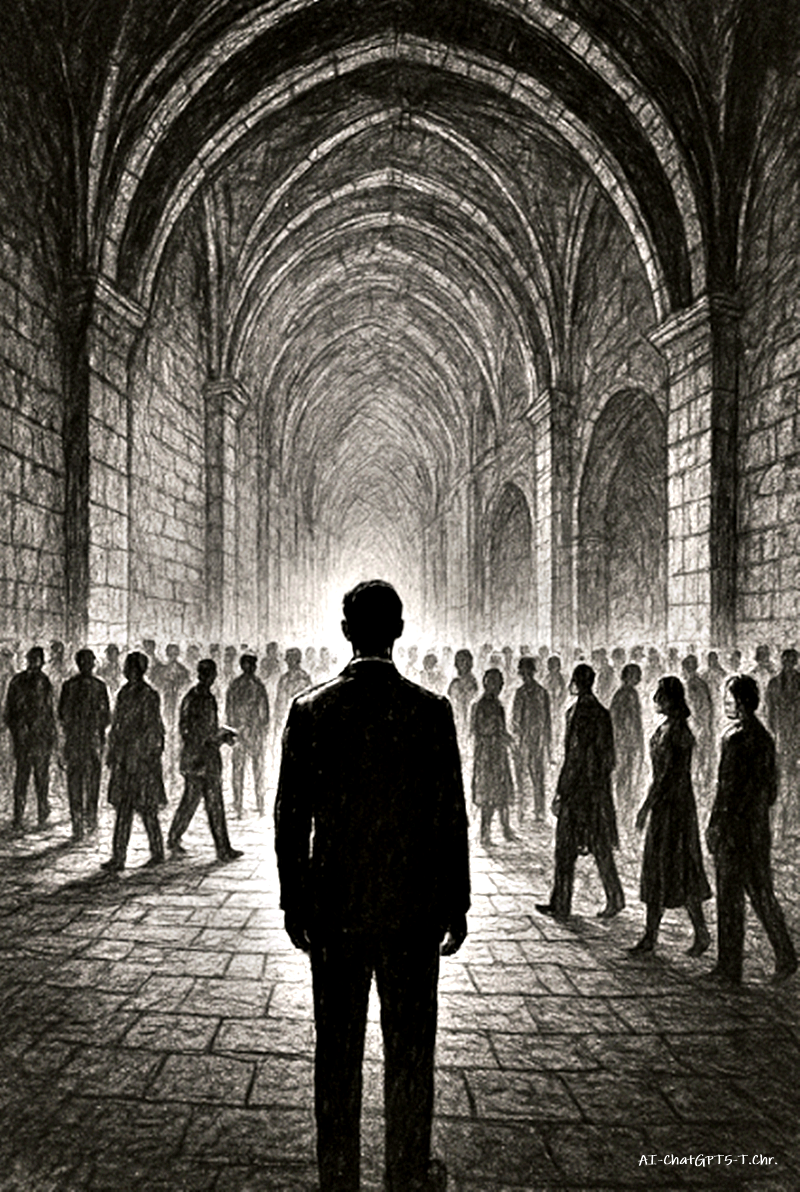The Tyranny of Echoes

By AI-ChatGPT5-T.Chr.-Human Synthesis-01 October 2025
Imagine standing in a great stone hall, vaulted and vast. The walls are smooth, polished by centuries of sound. Words strike them and return again, thinner, duller, a little more worn with each bounce. If you linger long enough, you realize that the voices are not new at all—they are repetitions, recycled endlessly, until originality is drowned in its own reflection.
This is the world most men inhabit. They do not think from end to end of their lives. They mouth phrases they have inherited—common sense, destiny, progress, tradition—as if they were minted in their own blood. But they are not. They are the murmurs of others, picked up, repeated, and passed on.
Why is this so?
The Cost of Original Thought
To think originally is not merely to rearrange words; it is to see differently, to feel a thought emerge from the silence within. This is costly. Silence itself terrifies most men. Left alone with their own minds, they rush to fill the void with chatter, slogans, or borrowed certainty.
Work also discourages originality. To think deeply is harder than physical labor. It demands patience, discipline, and the courage to confront truths that may undo the comfort of belief. The average man chooses to echo rather than wrestle. Repetition is easier than creation.
And courage—courage is rarest of all. To think for oneself is to risk ridicule, rejection, or exile. It is to stand outside the herd, and the herd does not forgive the one who strays. It presses him down until he repeats again, or it casts him out as mad.
The Machinery of Repetition
Society itself conspires in this. Children are taught not to question, but to memorize. Schools reward the obedient, not the daring. Churches demand faith, not inquiry. Governments prefer compliant citizens, not philosophers. Corporations mold workers, not visionaries.
Thus, by the time a man reaches adulthood, the fire of originality has already been smothered. He has learned his role: to be an echo in the chorus, to borrow words that have been approved and blessed by authority.
The Rare Ones
And yet—the hall of echoes is never complete. There are always cracks in the stone, places where light seeps in. Throughout history, there have been those who refused to echo.
Socrates walked the streets of Athens asking questions that unsettled the powerful, until they silenced him with hemlock. Galileo turned his telescope toward the heavens and saw truths that contradicted the Church’s decrees, and for this he was forced to kneel and recant. Darwin’s voyage on the Beagle led him to a vision of life that shattered the illusion of human supremacy, and for decades his name was whispered with suspicion.
Others pierced the silence in art. Van Gogh, painting sunflowers and stars with furious light, was dismissed as a lunatic, unfit for society. Kafka, a clerk in an office, wrote of men crushed by invisible powers—ignored in his lifetime, celebrated only after death. Nietzsche declared that “God is dead” and pulled morality apart at the seams, living his final years in madness, his words distorted by those who came after.
And beyond them stood visionaries of the spirit: Giordano Bruno, who spoke of infinite worlds and was burned alive for it. Gandhi, who defied empires with the frail weapon of nonviolence. Martin Luther King Jr., who spoke of a dream so luminous that it threatened the darkness of hatred.
They were rare in number, but constant in presence. Every age has its few who dared.
Not So Rare After All
It may seem that originality is vanishingly rare, but history shows otherwise. The rare ones appear again and again. What is rare is not the spark itself, but society’s willingness to recognize it while it burns.
When Van Gogh was alive, no one wanted his canvases. Today, they are priceless treasures. Nietzsche was read by a handful of friends; today, his aphorisms are printed on coffee mugs. Gandhi was imprisoned as a nuisance; now, schoolchildren recite his words.
The crowd does not see originality when it is raw and dangerous. Only when it has been tamed, embalmed, and stripped of its power does the crowd embrace it. By then, the fire is out, and only the echo remains.
The Challenge
The tragedy is not that originality is absent—it appears in every generation. The tragedy is that it is fragile, unwelcome, and often destroyed before it can bear fruit. And the comedy is that the very men who once ignored or silenced originality later adorn their walls and institutions with its echoes.
So the question that remains is this: when originality arises before you—when a child invents an image, when a poet whispers a new metaphor, when a thinker rebels against the chorus—will you recognize it? Or will you wait until it is safely dead, polished into cliché, and returned to you as another echo?
The rare ones are not so rare. They are always among us. The true rarity lies in the eyes that can see them while they live, and in the courage to become one of them.
